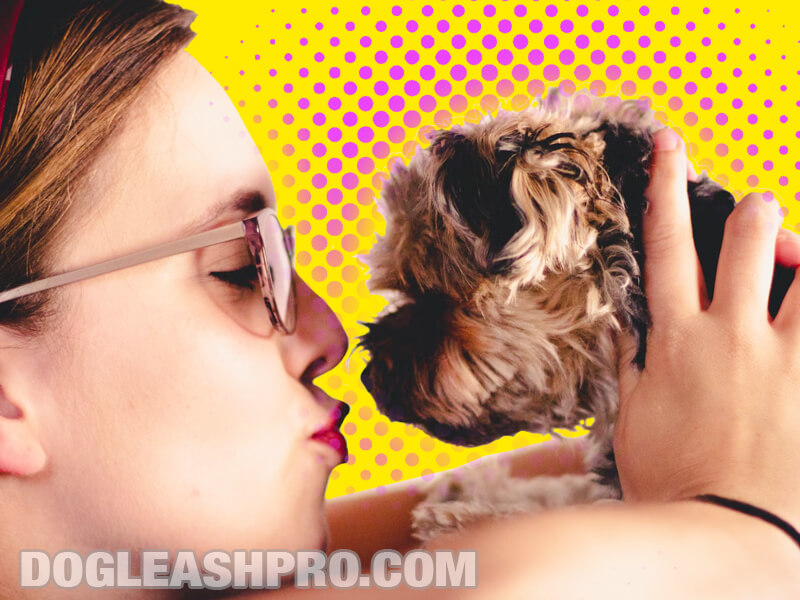

After a long day of work, many pet owners will naturally cuddle with their canine companions and shower them with tons of love and affection. One of the ways we show dogs our affection is by kissing, hugging, and petting them. But do dogs like human kisses and do dogs understand human kisses? Here’s the short answer first.
Do dogs like kisses? It depends on the situation, the timing of the kisses, and the dogs themselves. Generally, dogs feel threatened when strangers approach them with their mouths close to their faces. This can be viewed as assertive behavior in doggy language. Also, dogs usually greet other dogs by approaching from the side and not straight on. However, our dogs can learn to receive, enjoy, and understand kisses if they’re trained to tolerate kisses at a young age.
Kissing and hugging our furry friends is our way of connecting and bonding with them. In this guide, we’ll discuss the following:
- How do dogs feel when you kiss them?
- Are dog licks really kisses?
- Why do dogs lick us in a way that appears similar to kissing?
- Do dogs understand kisses and hugs?
- Should we keep showering our dogs with hugs and kisses or are there other ways of showing love and affection towards them?
Related Article: Why Do Dogs Wink?
Table of Contents
Do dogs understand kisses?
To answer the question, “Do dogs like kisses?” it’s important that we first know the answer to these questions: “does a dog understand kisses?” or “Do dogs know what kisses are?”
It’s important to note that while our canine companions are domesticated today, they descended from wolves that used to live outside in the wild for generations. As a result, they had to use innate survival strategies to protect and defend themselves in order to survive.
Read also: Dog Sleeps With Eyes Open (Should You Be Concerned?)
Therefore, dogs inherited this defense mechanism and they do not like it when a stranger comes up very close to their face.
As we can see, how we communicate and express our love and affection towards others is quite different than how dogs communicate love and affection. It’s safe to say that humans and dogs communicate in different ways.
Sometimes, we try to understand and interpret our dog’s behavior in human terms and our interpretation can be completely wrong.
On one hand, we as humans use either verbal or sign language to convey or communicate our emotions and ideas in order to get our point across.
On the other hand, our canine friends use facial expressions and body postures to communicate with other dogs.
You may also like: Why Does My Rottweiler Growl At Me?
You’re not alone if you’re wondering, “Do dogs understand human affection?” Researchers around the world have been fascinated by this question too. So they went ahead and studied dogs for many years as a way to understand them better.
They discovered that the dogs’ mind and their communication methods have evolved over thousands of years (over 30,000 years) from living with humans and other forms of human contact.
Through living with humans for thousands of years and undergoing both social and physical evolution, our furry friends were able to learn and adapt to our human behaviors and ways of communication.
Both behavioral scientists and researchers found out that domesticated dogs have great social-cognitive abilities that allowed them to be exceptionally attuned to human communication and behaviors.
Many domesticated dog breeds today have lost some, if not most of their wolf-like language traits. For instance:
- The Cavalier King Charles Spaniels have retained the least wolf-like communication traits.
- The German Shepherds lost about ⅓ of their wolf-like behavior and communication traits and were able to retain just ¾ of their ancestral wolf-like ways of communication and behavior.
- While the Huskies have retained the most wolf-like behavior and communication traits.
As we can see, the communication and behavioral traits amongst the different dog breeds can vary and this can make it difficult for one dog breed (Cavalier King Charles Spaniels) to communicate with another dog breed (the Siberian Huskies).
This is why it can sometimes be difficult for us, as dog owners, to understand our four-legged friends’ behavioral and communication traits. If you’re in this situation with your canine friends, don’t fret because you’re not alone.
If you’re giving your dogs kisses (whether on the face, head, or mouth) and they don’t seem to like it or they immediately snap at you, don’t get upset and don’t try to compare your experience to another dog owners’ experience.
All dogs are different and your dog breed may be different from another owners’ dog breed so the communication and behavioral traits may also be different.
Check out: Why Does My Dog Lay On Top Of Me?
Does my dog know what kisses are?
While our dogs do not innately or naturally understand what our human kisses mean, it doesn’t mean that they can’t learn to interpret what our behavior means.
Our furry companions are very smart and if you start kissing them on their face, head, nose, or mouth at a young age (during puppyhood) with hugs and cuddles then they will learn to associate kisses with love and affection.
Remember that it takes time and patience to teach our K9 friends the meaning of kisses and hugs. Since kissing isn’t something that dogs innately do and they don’t show other dogs love by kissing, we need to teach them that both kisses and hugs are positively associated with being loved.
DISCLAIMER: THIS WEBSITE DOES NOT PROVIDE MEDICAL ADVICE
The information, including but not limited to, text, graphics, images and other material contained on this website are for informational purposes only. No material on this site is intended to be a substitute for professional veterinary advice, diagnosis, or treatment. Always seek the advice of your veterinarian or other qualified health care provider with any questions you may have regarding a medical condition.
Resources:
https://www.ncbi.nlm.nih.gov/pmc/articles/PMC6116041/
https://www.merckvetmanual.com/dog-owners/behavior-of-dogs/normal-social-behavior-in-dogs

With over five years of specialized experience as an animal writer, my expertise lies in dog nutrition, health, behavior, grooming, and training. I am dedicated to delivering helpful and informative content that caters to the well-being of our furry friends. My primary goal is to empower pet owners with knowledge and ensure our canine companions thrive in health and happiness. In my free time, I love volunteering at local dog rescue centers.






